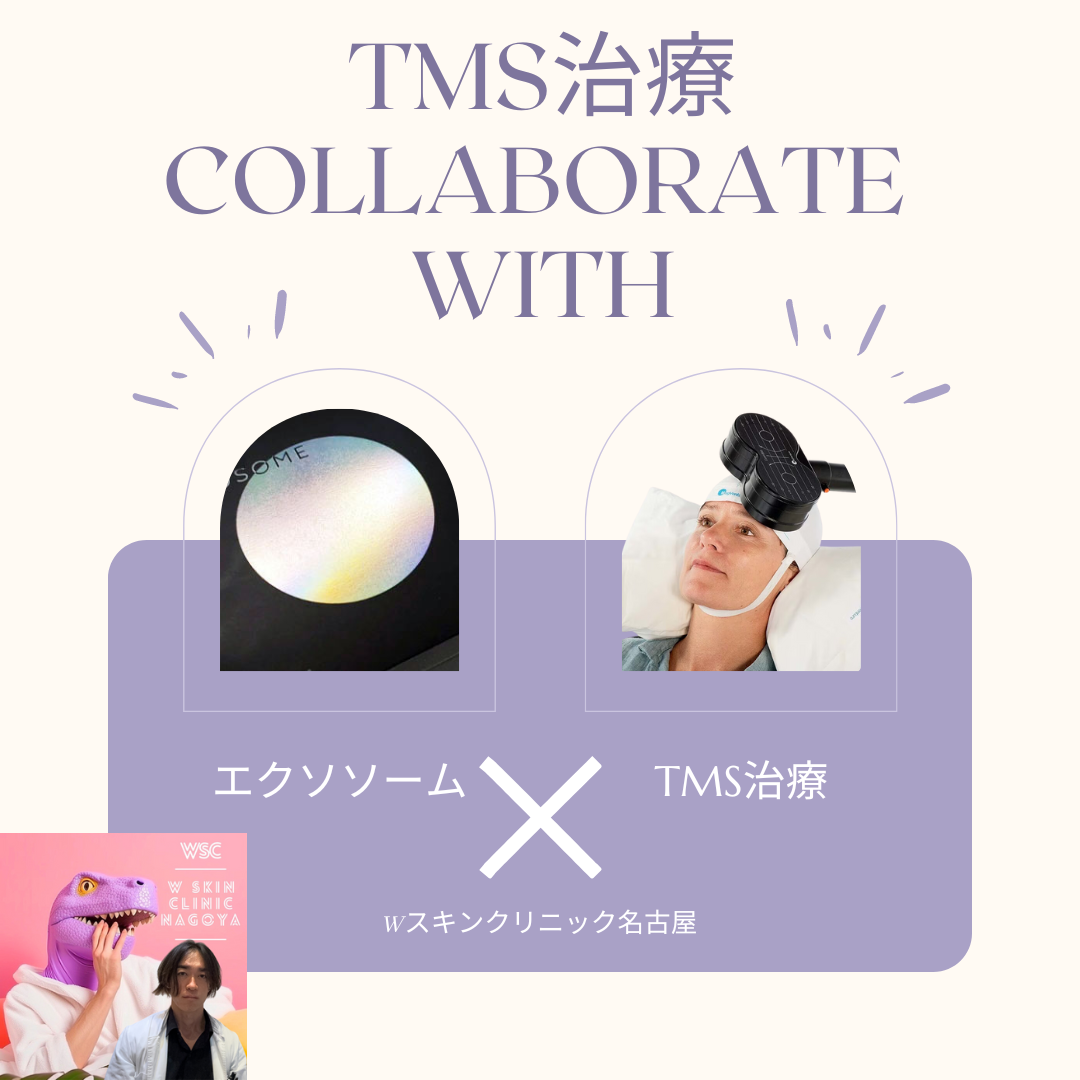NEWSお知らせ
2024.08.16|ブログ
エクソソームはうつ病に対して有効か?TMS治療との併用による効果について、名古屋の美容皮膚科医が解説

エクソソームはうつ病に対して有効か?TMS治療との併用による効果について、名古屋の美容皮膚科医が解説
こんにちは、Wスキンクリニック名古屋、院長の加藤晃司です。
今回は、エクソソームはうつ病に対して有効か?TMS治療との併用による効果について解説します。
(1)エクソソームがうつ病に対して有効か?
エクソソームは、細胞間のコミュニケーションを担う小さな膜小胞で、タンパク質やRNAなどの生体分子を含んでいます。これにより、細胞の修復や再生を促進し、神経変性疾患や炎症の治療に使用されています。最近では、エクソソームがうつ病に対して有効である可能性についても研究が進められています。
①メカニズム
神経再生の促進:
エクソソームに含まれる成長因子やmicroRNAは、神経細胞の修復や再生を促進します。これにより、うつ病に関連する神経回路の機能回復が期待されます。
抗炎症効果:
うつ病の病態には脳内の炎症が関与していることが示唆されています。エクソソームは炎症を抑える効果があり、神経細胞を保護することで、うつ病の症状を軽減する可能性があります。
遺伝子発現の調節:
エクソソームに含まれるmicroRNAは、神経細胞の遺伝子発現を調節し、脳内の神経ネットワークのバランスを改善することで、うつ病に対する治療効果を発揮する可能性があります。
②エクソソームとTMS治療の併用効果
**TMS治療(経頭蓋磁気刺激)**は、非侵襲的に脳の特定の部位に磁場を用いて刺激を与え、神経活動を調整する治療法です。特に、うつ病治療においては、前頭前野の活動を活性化することで、症状の改善が期待されます。
併用による相乗効果
神経再生と活動の調整:
TMS治療:神経回路の活動を調整し、脳の特定部位を活性化します。
エクソソーム:神経細胞の修復や再生を促進し、TMSによる刺激効果をサポートします。
相乗効果:TMSによって刺激された神経回路の再生がエクソソームによって強化されることで、より効果的な症状の改善が期待されます。
抗炎症と神経可塑性の増強:
TMS治療:神経可塑性を促進し、長期的な治療効果を提供します。
エクソソーム:抗炎症効果により、TMSの効果を補完し、神経細胞の健康を維持します。
相乗効果:炎症の抑制と神経可塑性の向上により、うつ病の症状がより効果的に緩和される可能性があります。
長期的な効果の持続:
TMS治療:神経活動の長期的な改善を目指します。
エクソソーム:遺伝子発現の調節を通じて、長期的な神経機能の維持に寄与します。
相乗効果:治療効果の持続が期待され、再発リスクの低減に寄与する可能性があります。
現在の研究状況
エクソソーム治療とTMS治療の併用に関する研究はまだ初期段階にあり、確立された治療法ではありませんが、理論的には相乗効果が期待されると考えられています。現在、エクソソームの安全性や有効性に関する臨床試験が進行中であり、うつ病治療における新たなアプローチとして注目されています。
まとめ
今回は、エクソソームはうつ病に対して有効か?TMS治療との併用による効果について解説しました。
エクソソームは、うつ病に対して神経再生、抗炎症、遺伝子発現調節のメカニズムを通じて効果を発揮する可能性があり、TMS治療との併用により相乗効果が期待されます。
当院ではエクソソームのうつ病への臨床試験を行っています。モニター募集しておりますので、ご興味のある方はクリニックまでご連絡ください。
Wスキンクリニック名古屋でのエクソソーム治療はこちら
https://www.w-clinic-nagoya.com/acne/exosome
NMN点滴はこちら
https://www.w-clinic-nagoya.com/beauty-drip/nmn
高濃度ビタミンC点滴はこちら
https://www.w-clinic-nagoya.com/beauty-drip/vitamin-c
*当院では
NMNは一般社団法人NMN医療研究会、エクソソームはセルソース株式会社のM2P-エクソソームを使用しています。
Wスキンクリニック名古屋
理事長 加藤晃司
当院では無料でスタッフカウンセリングを行なっております。
お気軽にご予約くださいませ
Wスキンクリニック名古屋 (美容皮膚科)
https://www.w-clinic-nagoya.com/
〒461-0005 愛知県名古屋市東区東桜 2-4-1 第3コジマビル6F
TEL 052-7377-7117(10:00~19:00)
LINE ID @w.nagoya
高岳駅より徒歩4分 / 新栄町駅より徒歩5分
お車でお越しの方
名鉄協商パーキングチケットをお渡しいたしますので、クリニック近くのパーキングをご利用ください。
Are Exosomes Effective for Depression? A Cosmetic Dermatologist in Nagoya Explains the Effects of Combined Treatment with TMS
Hello, I’m Koji Kato, the Director of W Skin Clinic Nagoya.
Today, I’ll explain whether exosomes are effective for depression and the effects of combining exosome treatment with TMS therapy.
(1) Are Exosomes Effective for Depression?
Exosomes are small membrane vesicles responsible for communication between cells, containing biomolecules such as proteins and RNA. They promote cell repair and regeneration and are used in treating neurodegenerative diseases and inflammation. Recently, research has been progressing on the potential effectiveness of exosomes in treating depression.
① Mechanism
Promotion of Neural Regeneration:
Growth factors and microRNA contained in exosomes promote the repair and regeneration of neurons. This can potentially lead to the restoration of neural circuits associated with depression.
Anti-Inflammatory Effects:
It has been suggested that brain inflammation is involved in the pathology of depression. Exosomes have anti-inflammatory effects and may alleviate depressive symptoms by protecting neurons.
Regulation of Gene Expression:
The microRNA contained in exosomes can regulate gene expression in neurons, potentially improving the balance of neural networks in the brain and exerting therapeutic effects on depression.
② Combined Effects of Exosomes and TMS Therapy
TMS (Transcranial Magnetic Stimulation) is a non-invasive treatment that uses magnetic fields to stimulate specific areas of the brain, modulating neural activity. In depression treatment, TMS is particularly expected to improve symptoms by activating the prefrontal cortex.
Synergistic Effects of Combination
Neural Regeneration and Activity Modulation:
TMS Therapy: Adjusts the activity of neural circuits and activates specific brain areas.
Exosomes: Promote the repair and regeneration of neurons, supporting the stimulatory effects of TMS.
Synergistic Effect: The regeneration of neural circuits stimulated by TMS may be enhanced by exosomes, leading to more effective symptom improvement.
Enhancement of Anti-Inflammation and Neuroplasticity:
TMS Therapy: Promotes neuroplasticity, providing long-term therapeutic effects.
Exosomes: Complement the effects of TMS with anti-inflammatory benefits, maintaining the health of neurons.
Synergistic Effect: The combination of inflammation suppression and enhanced neuroplasticity may more effectively alleviate symptoms of depression.
Sustaining Long-Term Effects:
TMS Therapy: Aims for long-term improvement in neural activity.
Exosomes: Contribute to maintaining long-term neural function through the regulation of gene expression.
Synergistic Effect: The combination may help sustain the therapeutic effects and reduce the risk of relapse.
Current Research Status
Research on the combined use of exosome therapy and TMS therapy is still in its early stages, and it is not yet an established treatment method. However, it is theoretically expected to have synergistic effects. Clinical trials are currently underway to evaluate the safety and efficacy of exosomes, and this approach is being closely watched as a potential new treatment for depression.
Summary
Today, I explained whether exosomes are effective for depression and the effects of combining exosome treatment with TMS therapy.
Exosomes may exert beneficial effects on depression through mechanisms such as neural regeneration, anti-inflammation, and regulation of gene expression. When combined with TMS therapy, synergistic effects can be expected.
Our clinic is conducting clinical trials on the use of exosomes for depression. We are currently recruiting participants for monitoring, so if you are interested, please contact our clinic.




